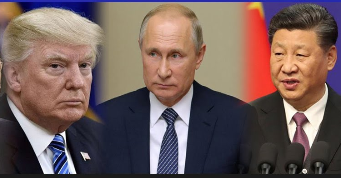[Trump Administration\China]
PeaceVoice\Mel Gurtov: “I suspect that behind the new level of China bashing lurks another motive: to divert Americans’ attention from Russia’s disinformation campaign, which is intensifying as the election nears.”
Photo: YouTube
PeaceVoice writer Mel Gurtov says Trump’s attacks on China is to diflect from Russia’s misinformation campaign to disrupt the 2020 Election.
The Trump administration’s orchestrated attack on China is commonly assumed to stem from upset over China’s human rights violations and its aggressive behavior in the South China Sea and along the border with India. Where once Trump was fulsome in praise of Xi Jinping’s leadership, now official statements on China are uniformly critical and alarmist.
With Secretary of State Mike Pompeo taking the lead, the criticism has escalated to the ideological level. Pompeo condemns not “China” but the Chinese Communist Party, using Cold War-era talking points that are reminiscent of the 1950s-1960s, when some US experts on the Soviet Union explained its behavior as due to Marxism-Leninism rather than national interest calculations.
But I suspect that behind the new level of China bashing lurks another motive: to divert Americans’ attention from Russia’s disinformation campaign, which is intensifying as the election nears.
Donald Trump never bought the 2017 National Security Council’s designation of both Russia and China as America’s chief security threats. Nor, as is well known, has he ever accepted the intelligence community’s findings—most recently amplified by a bipartisan Senate intelligence committee report and Michael Schmidt’s book, Donald v. the United States—that Russian entities colluded with the Trump presidential campaign in 2016 to promote his election. (“The country’s greatest intelligence failure since 9/11,” Schmidt writes.)
On the other hand, Trump has been after China on trade issues since the late 1980s. So long as the possibility existed of a major trade deal with China that Trump could proclaim a big win, he was willing to treat Xi Jinping the same way he treated Putin—as a dear friend doing his best in difficult circumstances.
With the onset of the coronavirus and the disruption to the trade deal, Trump unleashed the voices around him hostile to China, from Peter Navarro and Pompeo to Senators Tom Cotton and Ted Cruz. Thus began the lengthy list of anti-China measures—restrictions on technology transactions, closure of the US consulate in Wuhan; designation of the US office of the Confucius Institutes as an official Chinese mission; pressure on Chinese students and visiting scholars to return home; harassment of American scientists of Chinese descent as well as Chinese scientists collaborating with Americans; termination of the Peace Corps and public health cooperation with China; limitations on Chinese journalists and news organizations; sanctions on Chinese officials in Hong Kong and involved with military projects in the South China Sea; and (successful) threats to withdraw defense department funds from any US university that hosts a Confucius Institute.
Most of these steps have prompted Chinese counteractions, bringing the relationship to its lowest point in more than 50 years.
Nothing of the sort has happened in US relations with Russia. The administration has haphazardly implemented sanctions voted by Congress, thus failing to resolve Russian support of breakaway forces in Ukraine’s east.
Meantime, the Putin regime carries out state terrorism with another brazen Novichok attack, this time on his main political opponent, Aleksei Navalny. Neither Trump nor any of his minions has said a word about the attack, just as they have said nothing about any other Putin assault on regime critics, or about the apparent Russian bounty for US soldiers killed in Afghanistan. Nor has Trump said anything about Russian interference in the US electoral process, interference that is well documented and constant in social media. But of course the interference is for his benefit, for a price we can only guess.
Were Trump’s tax returns ever revealed, they would almost certainly show why Trump goes the extra mile to avoid any criticism of Putin’s authoritarian regime. Trump has long been compromised by his Russia financial entanglements. He has essentially become a Russian tool, a reliable agent of Russian policy—a “traitor,” according to his niece, Mary Trump—yet we hear nothing from the White House nor from supposedly anti-communist Republicans in Congress. With China, these same people can’t impose enough sanctions, can’t cry out with enough moral anguish, can’t warn enough about the strategic menace China poses—all while Russia gets a pass again and again.
US officials should certainly take China, as well as its corporate enablers, to task for its treatment of Uyghurs, Hong Kongers, and internal critics. But those officials should also recognize—as has the intelligence community—that it is the Russians, not the Chinese, who are interfering with elections in the US as well as in Europe, and therefore the Russians who are the most serious threat to US national security. And since those officials won’t do that, they must be replaced with people who will.
Mel Gurtov, syndicated by PeaceVoice, is Professor Emeritus of Political Science at Portland State University and blogs at In the Human Interest.








